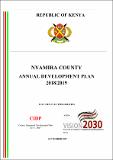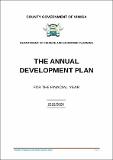| dc.description.abstract | Non-governmental organizations (NGOs) are non-profit entities that are not
affiliated with any government or political party and therefore, distinct from
both the state and private enterprises. The NGO sector in Kenya plays a key
role in implementing development programs, sometimes partnering with
the government and other times acting independently. The study analysed
the contributions of NGOs in promoting development in Garissa County.
Challenges NGOs face in implementing development programs in Arid and
Semi-Arid regions include limited and unsustainable financing, operational
challenges associated with working in conflict-prone areas, poor infrastructure,
low human resource capacity and limited community engagement. Limited
access to education and healthcare means that the local population may lack
the necessary skills and knowledge to actively participate in and benefit from
these programs. Retrogressive cultural norms, limited social cohesion, and low
levels of community organization make it difficult for NGOs to involve the local
population in programme implementation effectively. Furthermore, the study
found that the weak of coordination among NGOs, county government, and
national government leads to limited project ownership and overlapping of
projects, causing delays and inefficient utilization of resources. The study also
reveals that global political economy issues such as conflicts and pandemics
can have a significant impact on NGOs' operations and funding. Addressing
these challenges will require a multi-faceted approach that includes sustainable
financing through diversifying funding sources, deepening resource mobilization,
coordination and ensuring sustainable planning; strengthening coordination of
NGO activities through promoting joint working plans, monitoring and reporting;
ensuring effective community participation and investments in human capital;
and addressing political economy factors in project implementation including
through effective risk management and strengthening NGOs governance
structures. Only by addressing these challenges can NGOs effectively implement
development programs that lead to sustainable economic development in areas
of operation. | en |



